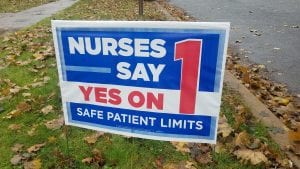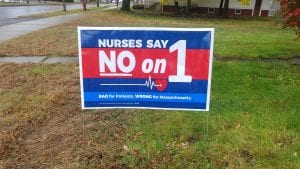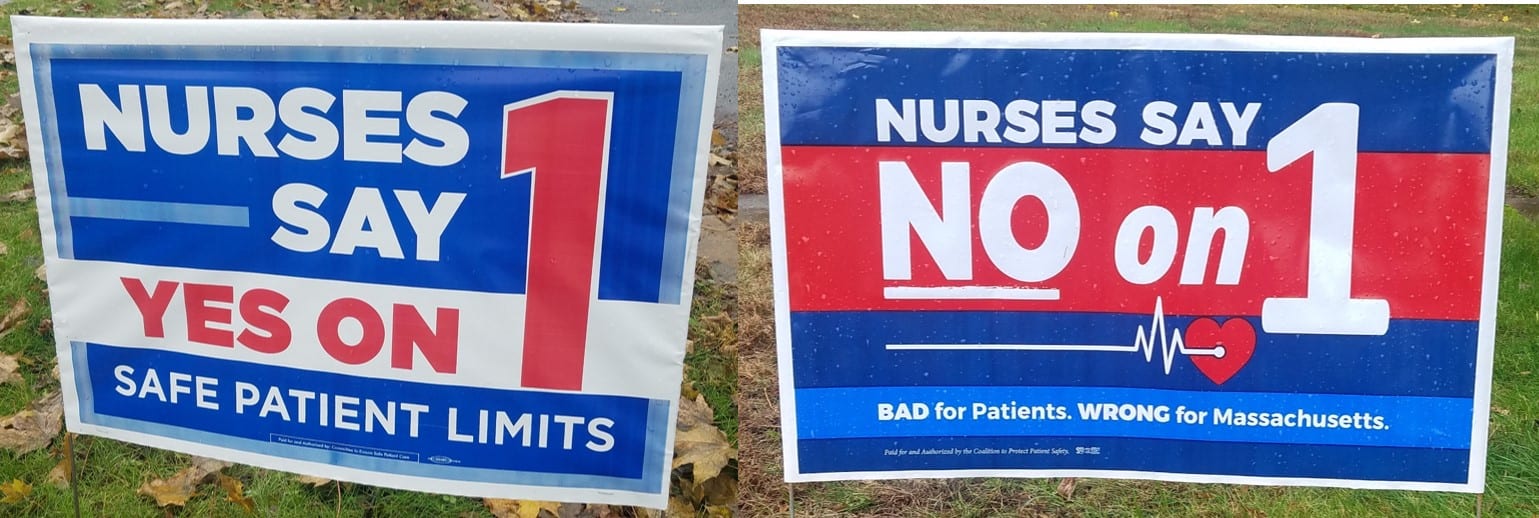WESTFIELD – One of the most controversial votes in Tuesday’s election will be that of ballot Question 1, which would limit the number of patients assigned to nurses. Television ads, signs, debates on the radio have been running for weeks, confusing many voters.
According to the Information for Voters booklet produced by William Francis Galvin, Secretary of the Commonwealth, Question 1 is a law proposed by initiative petition that would limit the number of patients that could be assigned to one registered nurse in hospitals and certain other health care facilities.
The maximum number of patients per registered nurse would vary by type of unit and level of care, for example; in units with step-down/intermediate care patients, 3 patients per nurse. In units with post-anesthesia care for operating room patients: 1 patient under anesthesia, 2 patients post-anesthesia per nurse.
In the emergency room: 1 critical or intensive care patient per nurse (or 2 if patient’s condition is assessed as stable), 2 urgent non-stable patients per nurse, 3 urgent stable patients per nurse; or 5 non-urgent stable patients per nurse.
In maternity unit with active labor patient, 1 patient per nurse. During birth and for up to two hours postpartum: 1 mother and 1 baby per nurse. Postpartum and well-babies, 6 patients per nurse.
In units with psychiatric or rehabilitative patients: 5 patients per nurse.
The proposed law would require a covered facility to comply with patient assignment limits without reducing its level of nursing, service, maintenance, clerical, professional and other staff.
The proposed law would require every facility to develop a written patient acuity tool to evaluate the condition of each patient. The tool would be used by nurses in deciding whether patient limits should be lower than the limits of the proposed law at any given time.
The state Health Policy Commission would be required to regulate implementation of the proposed law. The commission could report violations to the state Attorney General, who could file suit to obtain a civil penalty of up to $25,000 per violation, plus $25,000 per day if violation is continued after notification. It would also prohibit discipline or retaliation against any employee complying with the patient assignment limits.
The proposed law’s requirements would be suspended during a state or nationally declared public health emergency. The proposed law, if passed, would take effect on January 1, 2019.
According to the Executive Office of Administration and Finance, the proposed law would require state-owned hospitals to expend between an estimated $67.8 million and $74.8 million annual to comply, and the Health Policy Commission to expend an estimated $1.2 million annually to monitor compliance; adding that the overall cost is difficult to project due to lack of data.
According to Ballotpedia (ballotpedia.org), proponents of Question 1, primarily the Massachusetts Nurses Association (Committee to Ensure Safe Patient Care) have spent $10,578,736 in support of the petition. Opponents to Question 1, primarily the Massachusetts Health & Hospital Association (Coalition to Protect Patient Safety), have spent $18,934,754 in opposition to the petition.
 WHY VOTE YES?
WHY VOTE YES?
Paul Dubin, a registered nurse at Noble Hospital for 31 years (the last three under Baystate Noble), works in the rehabilitation unit of the hospital, and is the chair of the Massachusetts Nurses Association at Baystate Noble and on its bargaining unit.
Dubin said that Question 1 was put on the ballot by nurses for patients. He said it would provide the patient more time with nurses in order to provide better care, better education and limit readmission to the hospital.
“It’s a win for the hospital and patients,” Dubin said. He gave the example of a patient with a respiratory or congestive heart condition. He said nurses need to have the time at the bedside to teach patients how to take care of themselves when they’re released; and to report changes, such as weight gain for a heart patient. “If they’re not taught and given the education, they won’t know,” he said.
In talking about California, one of the few states with mandated nurse to patient ratios, Dubin said they have done very well. He said there has been a 40% increase of nurses at the bedside, and patients there receive 3 to 4 more hours of nursing care. The emergency room wait is 40% or more (shorter), because there are enough nurses in the ER, according to Dubin.
Dubin said it’s a statewide problem in Massachusetts, one that needs to be remedied. Dubin said that Massachusetts graduates 3,000 nurses a year, with only one other state in the country that graduates that many. “There are more than plenty to fill the void,” he said.
As far as the costs of implementing Question 1, Dubin said “it’s pretty amazing what the hospitals have said, and what the nurses have said.” He said MNA did an independent study that estimated the increased costs at $47 million, and that hospitals have blown it way out of proportion.
Dubin said if hospitals shift 3% of their budgets away from hospital executives and administrators’ salaries and costs, they could pay for this. He also wondered how much hospitals have spent on the campaign to vote No.
“This isn’t strictly business. It’s about helping patients get better quickly. It’s really about patients. What really irks me, is when people take money over care. It almost seems that way at times,” Dubin said. He said mandated ratios exist in other fields, such as the regulation by the Department of Transportation that tells truck drivers how many hours they can work.
“How many patients do you want me to take care of and be safe and reliable,” Dubin asked, saying increasing patients, decreases the nurse’s ability to take care of his or her patients.
“The government didn’t put this on the books. We did,” Dubin said. “It’s been a grassroots effort from the beginning. Bedside nurses put this on the ballot. It really comes down to safe patient limits,” he added.
 WHY VOTE NO?
WHY VOTE NO?
“My position has always been that I am opposed to a government mandated nursing to patient ratio,” said Senator Donald F. Humason (R-Westfield) of the debate, which he said has been around “for years.”
Humason said the need is different in every hospital, in every unit, at different times of day. He believes that nursing staff ratios need to be managed locally by nurse managers, “not by some bureaucrat at the Department of Public Health,” adding that DPH, who would be the regulating agency, thinks it’s a bad idea.
Humason acknowledged that the question was put on the ballot by the Massachusetts Nurses Association. He said this will be MNA’s priority going forward, and has been for longer than a decade. He said they couldn’t get it through the legislature, and put it on the ballot.
He said there were hospitals that were squeezing the margins, and making their nurses work harder than necessary. They knew it would come back. “I am against forcing nurses to do overtime. I don’t think they should be overloaded,” Humason added that he has two nurses in his family and both are against it.
Humason talked about Holyoke Medical Center, Baystate Noble and Cooley Dickinson Hospital; all hospitals he represents. “These hospitals are barely able to make ends meet. If this passes, they will be penalized. A fiscal penalty of $25,000 per shift will come out of the budget, and hurt those hospitals,” he said.
Humason also talked about a nurse shortage, saying that it’s hard enough to get nurses to come to the Pioneer Valley. He said the hospitals have a difficult time recruiting nurses, doctors, and specialists while competing with Boston, New York, and other cities that can pay more.
He said Noble used to have a hard time competing with Baystate and Mercy for new hires.
“Holyoke Medical Center is very concerned. They are already doing their best to staff nurses, and are having a difficult time hiring enough,” he said. Another stressor is that a lot of the nursing staff is aging, and it’s harder to recruit young people.
Humason said if the voters approve Question 1 as written, DPH will have to create that ratio, and mandate that for every shift, every unit, and every hospital, jeopardizing the quality of patient care, and increasing waiting time to get into hospitals.
He said that the needs can change every shift. “It’s so hard to implement. Over these past years; there’s a reason why it hasn’t become law,” Humason said. He also said the law is controversial in California, the first place to implement mandatory nurse to patient ratios, and one of the few places it exists.
“A lot of people in California say it doesn’t work,” he said.
Humason said Massachusetts has among the best health care in the country, and tinkering with that is potentially much more expensive and less efficient.
“I feel for the nurses who are forced to do overtime. It’s a terrible thing to inflict upon any kind of worker. Hospitals have been (working on the problem),” Humason said, adding that Question 1 doesn’t allow for flexibility. “This is a health care system that needs to be flexible,” he said.




